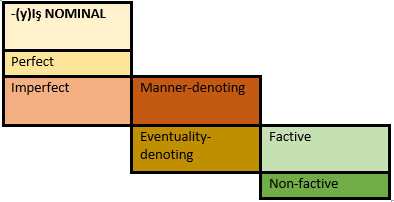M.S. Candidate: Ekinsu Özkazanç
Program: Cognitive Science
Date: 17.11.2022 / 11:00
Place: A212
Abstract: In Turkish, a variety of bound morphemes including but not limited to -mE, -DIK, and - (y)Iş can be attached to verb stems to form nominals. These nominals can either be fully noun-like (i.e. perfect) or still have verb-like qualities (i.e. imperfect). While imperfect nominals formed with any of these morphemes may denote eventualities, -(y)Iş nominals can also denote manner. These denotations appear to be dependent on other components, that is, they are compositional. Whether a nominal denotes an eventuality that has necessarily taken place (i.e. factive) or not is also an active area of inquiry, -(y)Iş nominals being generally characterized as factive. This thesis aims to systematically distinguish imperfect -(y)Iş nominals from perfect -(y)Iş nominals, manner-denoting -(y)Iş nominals from eventuality-denoting ones, identify the types of eventuality denoted, and identify the factivity status of eventuality-denoting -(y)Iş nominals. We suggested sets of tests for each category, and we applied these tests to a sample set of data to demonstrate that they can be used to reliably and accurately make these distinctions. The annotated dataset will be available for computational and linguistic research on event semantics of nominals.
